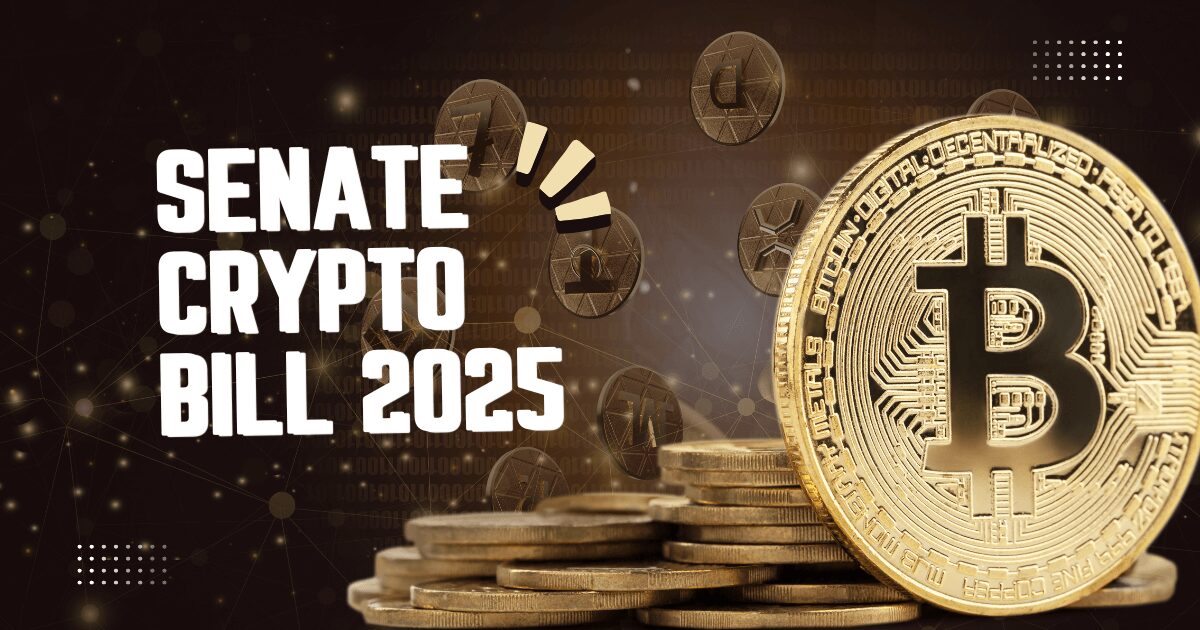The Senate Crypto Bill has sent tremors through the cryptocurrency ecosystem, and for good reason. For years, the crypto world has thrived in a regulatory grey zone. However, with this new legislation, the United States Senate is stepping into the spotlight to bring clear, comprehensive rules to an industry long criticized for its volatility, anonymity, and unpredictability.
In this article, we’ll break down everything you need to know about the Senate Crypto Bill, from its key provisions to its impact on exchanges, investors, startups, and decentralized finance (DeFi). Whether you’re a casual trader or a blockchain developer, the Senate Crypto Bill may redefine your future.
🏛️ What Is the Senate Crypto Bill?
The Senate Crypto Bill is a bipartisan legislative proposal to regulate digital assets, including cryptocurrencies, stablecoins, and blockchain-based financial services. It is designed to create legal clarity, consumer protection, and financial stability in an otherwise wild west environment.
The Senate Crypto Bill is not just a tweak or amendment. It’s a ground-up framework that could impact nearly every crypto transaction in the U.S.
🎯 Key Objectives of the Senate Crypto Bill
The Senate Crypto Bill focuses on five main areas:
1. Classifying Digital Assets
The bill provides a clear legal definition of crypto assets, categorizing them as commodities, securities, or digital currencies. This ends the turf war between the SEC and CFTC and streamlines who regulates what.
2. Licensing of Crypto Exchanges
Under the Senate Crypto Bill, all crypto exchanges must register with a federal digital asset regulator. This step ensures that platforms meet safety, financial, and security standards to protect users.
3. Stablecoin Regulation
Stablecoins will be regulated like financial institutions. The bill mandates 1:1 backing with audited reserves and complete transparency. Issuers must register and comply with banking-grade oversight.
4. Tax Compliance
The IRS will now have stronger guidelines for tracking and taxing crypto activity. Users will be required to report transactions over a certain threshold, and exchanges will submit user tax information directly.
5. DeFi Accountability
The Senate Crypto Bill introduces regulatory oversight of decentralized platforms. Smart contracts and DeFi app developers may be held liable if users commit fraud or violate AML laws using their tools.
📉 Why the Crypto Market Reacted So Sharply
The announcement of the Senate Crypto Bill triggered an immediate downturn in crypto prices. Bitcoin fell by 6%, Ethereum by 8%, and altcoins took a heavier beating.
Why? The crypto industry thrives on freedom, anonymity, and decentralization, and the Senate Crypto Bill threatens all three. With the prospect of compliance costs, legal accountability, and KYC enforcement, many crypto players fear a loss of the “trustless” advantage that made blockchain revolutionary.
🧑💼 How the Senate Crypto Bill Affects You
Whether you’re a retail investor or a crypto entrepreneur, the Senate Crypto Bill has real consequences:
✅ For Investors
- More secure platforms due to mandated regulation.
- Tax enforcement on all capital gains and losses.
- Potential delisting of tokens considered securities.
🛑 For Day Traders
- Increased KYC/AML compliance on exchanges and DEXs.
- Loss of anonymous wallets on U.S.-based platforms.
- Transaction thresholds for IRS reporting (e.g., $600+).
🚀 For Startups & Founders
- Legal liability for smart contract misuse.
- Licensing requirements for launching tokens or exchanges.
- Reduced fundraising flexibility, especially for anonymous teams.
The Senate Crypto Bill shifts crypto from a free-for-all to a licensed, audited, and regulated financial space.
🪙 Stablecoins Under the Microscope
The Senate Crypto Bill centers on stablecoins. The legislation seeks to eliminate “algorithmic” stablecoins like UST and impose strict rules on fiat-backed coins like USDC or USDT.
🔒 Key Stablecoin Provisions:
- 1:1 Reserve Requirements: All coins must be fully backed by fiat.
- Monthly Public Audits: Transparency is no longer optional.
- Licensing for Issuers: No more unregistered entities launching coins.
This approach may stabilize the market and restore investor confidence but could also force smaller issuers out of the U.S. market.
🌐 The Senate Crypto Bill vs DeFi
DeFi – once the ultimate decentralized frontier – is now squarely in the regulatory crosshairs. The Senate Crypto Bill aims to bring oversight without completely crushing innovation.
🧩 Proposed DeFi Changes:
- Mandatory Identity Verification for Users.
- Developer Accountability if protocols are exploited.
- Third-Party Security Audits before launch.
This could put enormous pressure on open-source developers and may result in developers geo-blocking U.S. users or exiting the U.S. entirely.
Also Read Here: How to Boost Your Disney Chase Card Credit Score Fast.
🗣️ Reactions from the Crypto Community
The Senate Crypto Bill has generated mixed responses across the crypto landscape:
🟢 Supporters Say:
- It provides legitimacy and invites institutional investors.
- It protects users from fraud and scam projects.
- It encourages responsible innovation.
🔴 Critics Argue:
- It threatens decentralization and freedom.
- It favors Wall Street over open-source projects.
- It creates entry barriers for small creators.
Major industry players like Coinbase and Kraken are cautiously optimistic, while DeFi developers and NFT platforms have sounded alarms.
📆 What’s Next for the Senate Crypto Bill?
The Senate Crypto Bill has not yet passed. It’s currently on the committee and undergoing analysis. However, here’s what to expect:
🗓️ Timeline:
- Q2 2025: Public consultations and expert testimonies.
- Q3 2025: Senate votes and potential amendments.
- Q4 2025: Final voting and possible presidential signing.
⚖️ Potential Outcomes:
- Whole Passage: Crypto becomes a heavily regulated industry.
- Significant Amendments: DeFi exemptions and tax reliefs were added.
- Rejection: Back to regulatory uncertainty.
The Senate Crypto Bill will evolve, but the pressure for regulation is now irreversible.
📌 How to Prepare Now
If you’re involved in crypto in any way, don’t wait. The Senate Crypto Bill is honest and will change how crypto operates in the U.S.
✅ Steps to Take:
- Track legislation updates weekly.
- Use compliant exchanges with strong KYC policies.
- Start recording all your transactions for tax season.
- Get legal help if launching or managing crypto projects.
- Diversify your strategies to reduce risk exposure.
💬 Final Thoughts: The Beginning of a New Chapter
The Senate Crypto Bill isn’t just another policy document. It’s a foundational shift. While it may bring discomfort and volatility in the short term, it also represents the maturing of a once-fringe financial technology into mainstream relevance.
The crypto industry must now adapt and evolve or remain in the shadows.
One thing is clear: whether you’re a trader, builder, or believer, the Senate Crypto Bill will shape the next era of crypto history.
FAQs
What is the Senate Crypto Bill?
The Senate Crypto Bill is a proposed U.S. law aiming to regulate the cryptocurrency industry. It covers exchange licensing, stablecoin oversight, tax compliance, and decentralised finance accountability
How will the Crypto Bill affect crypto investors?
If passed, the Senate Crypto Bill will require investors to report more crypto transactions for tax purposes, use only licensed platforms, and comply with stricter KYC (Know Your Customer) rules. While it may limit some freedoms, it could also reduce fraud and improve market stability.
3. Does the Bill ban DeFi or decentralised platforms?
No, the Senate Crypto Bill does not ban DeFi outright, but it introduces regulations. Developers may be required to implement user identity checks, undergo audits, and take responsibility if their smart contracts are misused, which could significantly change how DeFi operates in the U.S.







